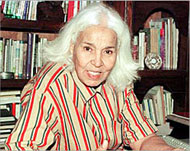Leftist party boycotts Egypt poll
Egypt’s largest leftist party and an independent candidate have decided to boycott the presidential election in September.

The Tagammu Party accused the government of being despotic and obstructing political reforms sought by the opposition, while Egyptian-US sociologist, Saad Eddin Ibrahim, withdrew on the grounds that the government is not serious about holding free and fair elections.
“We don’t want to be bit actors in a play the outcome of which is known in advance,” Rifaat al-Said, secretary-general of the Tagammu Party, told a news conference on Tuesday.
“The general secretariat decided by a majority not to nominate anyone from the party leadership for the presidential elections and to boycott these elections,” a statement said.
“The government maintains despotic conditions, has stood against any constitutional or political reform and insists on no judicial supervision (of the elections),” it said.
President Hosni Mubarak, 77 and in power since 1981, is expected to seek a fifth six-year term in the election, the date for which could be announced next Sunday.
Failed chance
This will be the first election in Egypt with more than one presidential candidate, after a constitutional amendment in May abolished the system of referendums on a single candidate chosen in advance by parliament.
 |
|
The Ghad Party’s Ayman Nour is |
But the only prominent politician still likely to challenge Mubarak is Ayman Nour of the liberal Ghad (Tomorrow) Party, who was detained earlier this year and is on trial on forgery charges which he and his party say are politically motivated.
Said said the Tagammu had given the authorities a chance to fulfill their promises of a level playing field for the presidential election, but had now abandoned hope.
The party had complained five times that local authorities had removed party banners while leaving in place those of Mubarak’s National Democratic Party, he said.
State newspapers and television stations rarely mention any opposition groups or their activities, while giving extensive coverage to all Mubarak’s public appearances and portraying him as a wise and benevolent leader.
The liberal Wafd Party and the Nasserist Party, which advocates pan-Arab nationalism, are expected to follow the Tagammu’s example within days, political sources said.
Campaigns abandoned
In a statement on Monday, Ibrahim announced he will not stand in September’s election, becoming the second aspirant for the nation’s top job to withdraw from running in three days.
On Saturday, feminist Egyptian presidential aspirant Nawal el-Saadawi, 73, also pulled out of the race, saying the amendments to the nation’s constitution prevented serious independent contenders from entering the race.
 |
|
Writer Nawal el-Saadawi stopped |
Ibrahim said he withdrew because serious contenders were being blocked from running in the election by a limited constitutional amendment passed in a May referendum allowing multi-candidate elections.
“In solidarity with a national coalition of democratic forces calling for a boycott of this political farce, I must declare my withdrawal as a presidential contender,” said Ibrahim, who had in October announced his bid to contest the election.
The independents would not have been on the ballot anyway because the constitutional amendment sets strict conditions for non-party candidates to stand.
The banned but normally tolerated Muslim Brotherhood, widely seen as the strongest opposition force, says the restrictions on independents aim to stop the Islamist group from fielding a candidate.
A visiting US official said last week that Washington believed the government was serious about political reform.
The official, Deputy Secretary of State Robert Zoellick, said he had again pressed the Egyptian government to let international observers monitor the election. The government has not taken a position on the proposal.